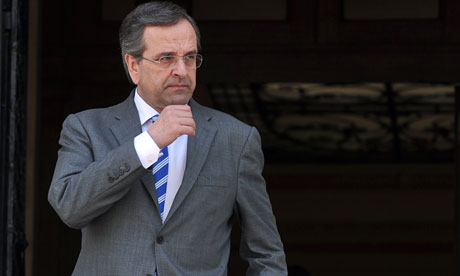Helena Smith guardian.co.uk, Thursday 27 June 2013 04.02 AEST
Antonis Samaras has rearranged his cards – but vast Greek debt keeps him playing the same hand
Greek prime minister Antonis Samaras. Photograph: Louisa Gouliamaki/AFP/Getty Images
On his first day in office with his newly reshuffled cabinet, the Greek prime minister Antonis Samaras had a to-do list that included dealing with striking seamen and trolley-bus drivers, discussing the privatisation of Pireaus port and preparing for talks with the creditors keeping Greece's defunct economy afloat.
At the same time, tax employees prepared for battle with a 48-hour strike; protesting staff continued to occupy the main offices of the public broadcaster, ERT, while thousands of entrepreneurs representing small-and medium-sized businesses took to the streets. The focus of their fury: "hunger pensions" and cuts to a health system on the point of collapse.
For any other government, fighting fires on so many fronts would prompt a response that would be, at best, crisis management. In Greece, however, it's business as usual.
With his newly installed team, Samaras hopes to handle the myriad problems confronting the country with a new zest and tact. The reshuffle, a year and a week after he assumed power, had been long overdue. The sudden departure from the coalition government of the small Democratic Left party, Dimar, provided the perfect alibi for a radical restructuring of a tripartite alliance that had begun to look lacklustre and lazy. There was, said Samaras, "not a moment to waste" in the battle to save the debt-stricken nation.
But far from boding well, there is also a sense of déja vû about the new administration. With Dimar's exit, the coalition is now comprised solely of figures from the two mainstream political forces most blamed for the country's woes. The recycling of politicians from both the conservative New Democracy and socialist Pasok parties has been met with incredulity and derision.
Many are wondering how politicians who have already been tried and tested – frequently displaying a marked reluctance for reforms – can possibly put Greece back on its feet.
Michalis Chrysohoidis, the Pasok cadre elevated to run the transport ministry, caused uproar last year when he admitted he hadn't even read the first bailout accord outlining the onerous terms Athens had agreed to in return for funds from the EU and IMF. He was public order minister at the time.
The appointment of Adonis Georgiades as minister of health – one of the most sensitive portfolios – has caused similar dismay. A conservative extremist, Georgiades is more usually associated with the talk show he hosts exhorting the glories that were ancient Greece.
Both are indicative of a power-sharing arrangement that more resembles a balancing act. For the first time since being plunged into its worst crisis in living memory, there is an overwhelming sense that the country is in the hands of a government that is buying time.
Geopolitics have forced a semblance of stability on Greece. The German elections in September have increased expectations that what lies ahead is a slow-motion summer of little or no policymaking that could rock the boat.
But few have bought the government's argument that Greece is on the road to recovery. Even fewer believe Samaras' prognostications that with the benefit of hard work, yet more austerity will be kept at bay.
Indeed, many are certain it is only a matter of time before the crisis intensifies when the coalition is forced in the autumn to take fresh measures to avoid the collapse of the pension system.
With unemployment now at a record 27% and poverty soaring, Greeks may be forgiven for believing that the real truth lies not so much in the notion of hard labour, but in the rules of the game being changed.
Short of a deus ex machina, the crisis engulfing Greece will only be resolved when its debt load is somehow forgiven.
![The [Greek] European Tragedy](https://blogger.googleusercontent.com/img/b/R29vZ2xl/AVvXsEiWKI5s90SFm1wWTk6bs4p7CgslaC2SnYPsrZhb-B-smOufNNCSxCvpBLI9hOB-LsXZjir_PNmEiMk2-E62F3xkg96IoC6QFAaZAnPRTVH340IN9WBRmWJqPkjWlgyRj3zpALp7h6hvA58/s920/GkBack_new.jpg)
